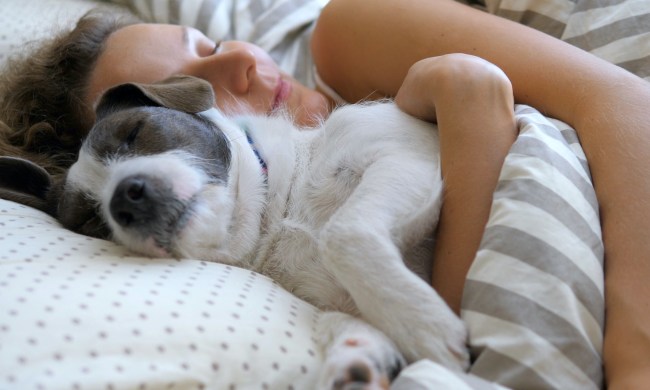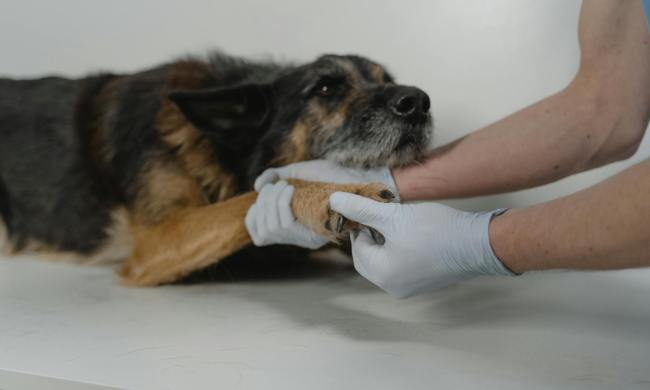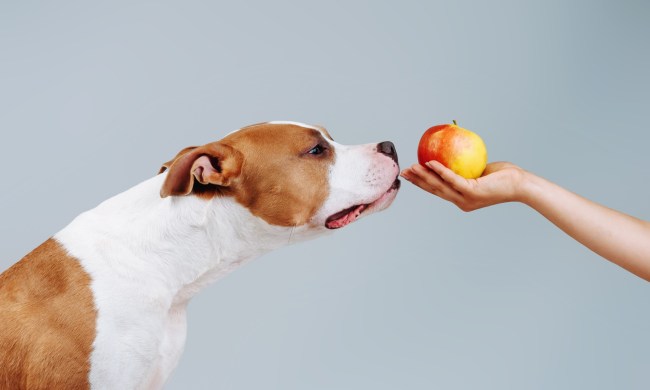So you’ve decided to add a Rottweiler puppy to your family. Congratulations! You’ve chosen a breed that’s among the most popular in the US. Rottweilers, fondly known as Rotties, are devoted, loyal, and loving companions. They are also known for having huge appetites and are on the American Kennel Club’s (AKC) list of “10 Dog Breeds That Love to Eat.” That doesn’t mean, though, that you should let a Rottie eat you out of house and home. In fact, being a responsible pet parent means providing proper nutrition while helping your dog maintain a healthy weight.
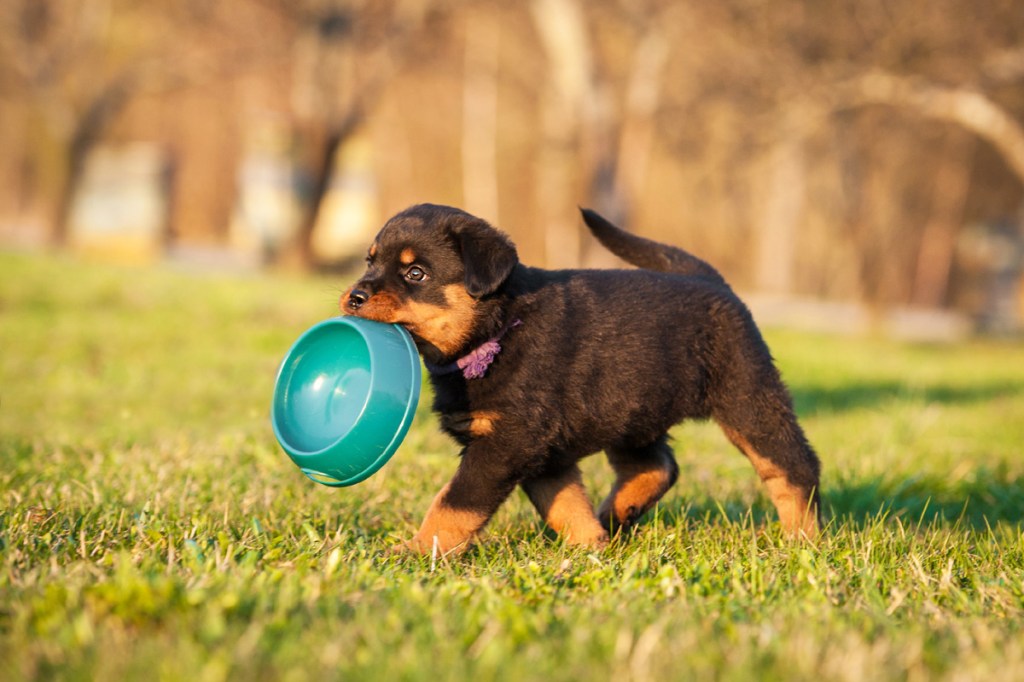
What should I feed my Rottweiler?
Choosing the right food for your Rottie puppy can be a daunting task. In a Cummings School of Veterinary Medicine article, veterinary nutritionist Sally Perea, DVM, MS says that many large breed puppy parents make the mistake of feeding adult dog food to their pets. It’s important, says the nutritionist, to choose a diet specifically formulated for large breed puppies. These diets are designed to meet the nutritional needs of growing puppies who have twice the daily nutritional requirements of mature adult dogs say nutritionists at PetMD. When researching pet food, it’s important to check the label for a “complete and balanced diet” statement which signifies that the food meets the nutritional values established by the Association of American Feed Control Officials (AAFCO).
How much to feed a Rottweiler puppy
It’s important to follow the feeding instructions on the pet food label based on your pup’s age and weight. Puppies should be fed smaller amounts of food several times a day, rather than feeding too much food all at once. It’s essential not to overfeed puppies as it can lead to a life of health problems, with overweight puppies being more likely to become overweight or obese adult dogs, say nutritional experts. Your veterinarian can help determine a healthy weight for your puppy and advise adjustments when necessary during health check-ups.
What is the best food for a Rottweiler puppy?
Following are three puppy foods that have received positive reviews and are also highly rated by pet parents.
Royal Canin Rottweiler Puppy Food
Benefits at a glance:
- Designed to meet the nutritional needs of Rottweilers 8 weeks to 18 months old.
- High-quality proteins and prebiotics support digestion and promote optimal stool quality.
- Helps support the development of a puppy’s immune system with a selection of antioxidants including vitamin E.
Wellness Complete Health Large Breed Puppy
Benefits at a glance:
- Developed without any GMOs, meat by-products, fillers, or artificial preservatives.
- Specially formulated to provide whole-body nutritional support for a large breed puppy.
- Supported by omega fatty acids, essential vitamins, antioxidants, glucosamine, and probiotics.
Eukanuba Large Breed Puppy Dry Dog Food
Benefits at a glance:
- Supports muscle growth and bone health in active pups with high-quality animal protein and optimized levels of calcium and phosphorous.
- Supports healthy brain development with DHA.
- Provides concentrated energy from fat and carbohydrate levels beneficial for growing puppies.
Transitioning to adult dog food
Large breed puppies should be kept on a puppy diet until they reach 12 to 18 months of age says veterinary nutritionist Dr. Lisa M. Freeman. When it’s time to transition your Rottie to adult food choose a diet suitable for large breed dogs. And once again, check that the diet meets the AAFCO standards for a complete and balanced diet. Your veterinarian can help with establishing a healthy diet for your adult dog depending on gender and size. An adult male Rottie can have a weight range of between 85 and 135 pounds while a female can weigh between 80 and 100 pounds.
What human foods can Rottweilers eat?
It can be fun to offer your puppy fruits and vegetables as an occasional healthy treat, but keep in mind that some fruits and vegetables are toxic to pets. When in doubt, check in with your veterinarian before giving any new food to your dog.
Vegetables that are safe for dogs:
- broccoli
- brussel sprouts
- carrots
- cauliflower
- celery
- green beans
- peas
- spinach
- zucchini
Fruits that are safe for dogs:
- apples
- bananas
- blueberries
- cantaloupe
- cranberries
- pineapple
- raspberries
- strawberries
- watermelon
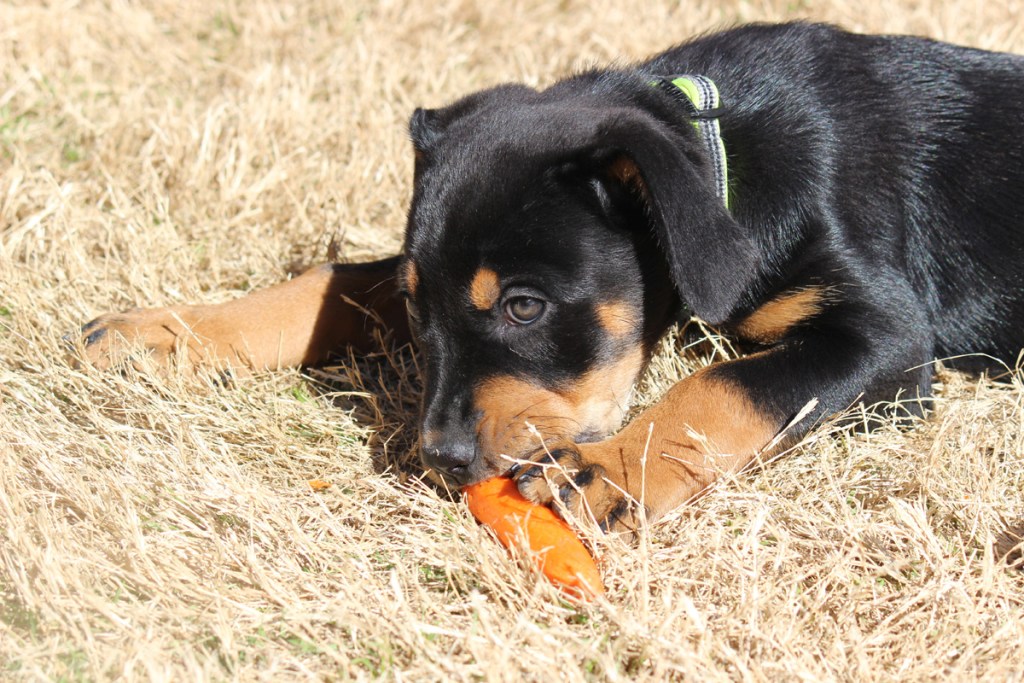
Finally, Rotties are masters at begging for food but it’s important not to offer leftovers from your plate. Obesity is a serious concern for this breed and can lead to joint problems, digestive disorders, back pain, and heart disease. Providing the right balance of food, exercise, and mental stimulation will help keep your Rottie happy and healthy for years to come.

